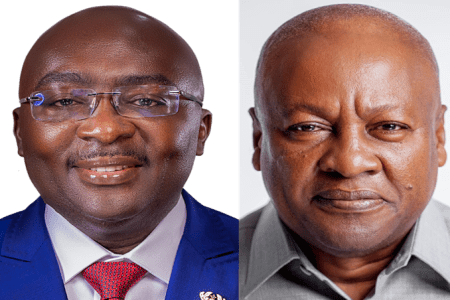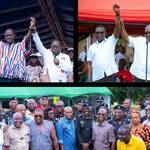In Ghana, the energy sector is both a critical driver of growth and a major contributor to economic challenges, particularly due to mounting debts.
Accumulating approximately $1 billion annually, with nearly half of this debt stemming from excess capacity charges, the sector’s financial strain intensifies economic instability.
As the New Patriotic Party (NPP) and the National Democratic Congress (NDC) prepare to present their contrasting energy policies, their divergent strategies on renewable energy, infrastructure, oil and gas development, and energy pricing come into sharper focus.
This comprehensive look at each party’s policy approaches reveals competing visions for a sustainable, affordable, and efficient energy future.
Currently, government’s aim is to raise this renewable share to 10% by 2030, setting incremental milestones toward energy sustainability without overly disrupting existing systems.
2,000 MW of Solar for 50% cost reduction
The NPP is setting ambitious targets to reshape Ghana’s energy landscape by adding 2,000 megawatts (MW) of solar power to the national grid.
Spearheaded by Dr. Mahamudu Bawumia, the NPP’s goal is to reduce electricity costs by 50%, targeting industrial and manufacturing sectors that rely heavily on affordable and stable power.
Ghana’s current electricity consumption hovers around 4,000 MW, meaning that the proposed solar addition could meet almost half of the country’s energy demand.
Dr. Bawumia’s vision to add 2,000 MW of solar power to Ghana’s energy portfolio is ambitious, with the potential to substantially lower electricity costs, cut national expenditure on imported fossil fuels, and boost job creation.
His proposed model includes setting up a solar panel manufacturing industry in Ghana, which could establish a new manufacturing subsector and reduce the import costs associated with renewable technology.
Dr Bawumia has also proposed net metering incentives, where users of solar power can sell excess energy back to the grid, a policy that could encourage widespread adoption of renewable energy.
This solar-driven model aligns with the NPP’s broader economic strategy, which focuses on achieving energy independence, reducing Ghana’s carbon footprint, and stabilizing energy costs. With solar power, Bawumia argues, Ghana can avoid the price hikes that come with traditional energy sources, thus creating a more predictable and business-friendly environment.
Solar panel manufacturing factories
Beyond lowering energy costs, the NPP plans to establish solar panel manufacturing factories in Ghana to reduce import dependency.
NPP emphasized that solar energy’s stability could shield Ghana from the price volatility often associated with hydro and thermal energy sources, thus providing more predictable energy pricing for businesses and households alike.
NPP’s Solar vs. NDC’s Hydro, Thermal
While the NPP focuses heavily on solar, the renewable strategy of the NDC led by flagbearer John Mahama places a stronger emphasis on hydro and thermal power as the cornerstones of Ghana’s energy sector.
The NDC supports diversification, but sees hydro as a reliable, established source, pointing to its proven role in large-scale power generation.
Thermal energy, often backed by natural gas, also aligns with the NDC’s emphasis on energy stability and reliability.
Thermal and Hydro energy currently form a significant part of Ghana’s energy mix, alongside a modest 3.8% contribution from renewable sources, including wind and solar.
Energy security and infrastructure development
The NPP and NDC are both committed to enhancing energy infrastructure but with distinct priorities.
The NPP is focused on modernizing and expanding the grid to accommodate the integration of renewable energy.
This approach includes upgrading transmission lines and extending access to underserved areas, which they argue will improve energy security while supporting renewable energy adoption.
Conversely, the NDC plans to prioritize improvements to existing infrastructure with a focus on enhancing stability in power distribution.
Their infrastructure strategy includes modernizing power plants, expanding transmission lines, and increasing electricity access in rural communities.
The NDC also advocates for local content in energy projects, aiming to create job opportunities and build local capacity in energy production and maintenance.
Oil and gas policies
Ghana’s oil and gas sector remains a significant revenue source, and the two parties have differing visions for its future.
The NPP seeks to attract investment by creating favorable conditions for foreign players, aiming to diversify the economy using revenues from oil and gas.
Their policy framework encourages partnerships that optimize production while promoting local participation and efficiency in the sector.
The NDC, however, emphasizes sustainability and maximizing local content in oil and gas projects.
Their policies focus on using oil revenues to fund social and infrastructure initiatives that benefit Ghanaians directly.
The NDC’s approach also stresses environmental responsibility, aiming to mitigate the ecological impact of energy extraction and production.
They propose a transparent system where revenues are allocated to social programs, further asserting the role of oil and gas in Ghana’s development.
Energy pricing: Efficiency vs. affordability
Energy pricing has been a contentious issue, with both parties taking unique stances on balancing affordability and sustainability.
The NPP supports a cost-reflective tariff structure, which minimizes subsidies and is designed to attract investment by ensuring transparency and operational efficiency.
The NPP believes that reduced government interference in energy pricing will foster competition and drive innovation.
The NDC, in contrast, advocates for targeted subsidies to protect vulnerable populations and ensure energy remains accessible to all.
Their proposed pricing model includes a more equitable tariff system aimed at stabilizing costs, especially for low-income households.
The NDC argued that their subsidy-driven approach will make energy affordable for all sectors, while still promoting investment in energy infrastructure.
Energy efficiency and local content
Both parties recognize the importance of local content and energy efficiency, but they approach it in different ways.
The NPP promotes energy efficiency by encouraging energy-saving practices and technologies across all sectors, aiming for a sustainable reduction in consumption.
This approach, they argue, will make energy more affordable and reliable by reducing strain on existing resources.
The NDC, while also committed to energy efficiency, emphasizes its application in government buildings, industries, and households.
They aim to incentivize energy-efficient practices through revised building codes and public education.
For the NDC and ex-President Mahama, energy efficiency is not just about cost savings but is also a means of reducing wastage and optimizing resource use.
On local content, both parties promote local job creation within the energy sector.
The NPP’s approach centers on building domestic manufacturing capabilities, particularly for solar panels, while the NDC emphasizes broader industry participation and local capacity building across the energy sector.
NDC’s stance
The NDC’s commitment to hydro and thermal energy reflects its focus on providing a stable and reliable energy foundation for Ghana.
This approach prioritizes stability over the rapid adoption of renewables, aiming to secure energy availability across the nation while incrementally integrating renewable sources.
The NDC believes that while solar and other renewables are essential for the future, they should complement rather than replace established power sources.
Competing visions for energy sector
As Ghana heads towards December 7 electoral, the stark differences between the highlight the choices that voters face. NPP’s solar-centric vision and the NDC’s focus on hydro-thermal stability
The NPP’s ambitious goal of bringing 2,000 MW of solar power online to cut costs by 50% and promote energy independence marks a bold step toward a sustainable energy future.
Meanwhile, the NDC’s focus on energy stability, inclusivity, and local content reflects a pragmatic approach rooted in gradual modernization and accessibility.
Both visions aim to address the energy sector’s debt cycle and foster economic growth, yet each presents unique strategies that could shape Ghana’s energy future in profoundly different ways
- Dr. Boako criticizes Finance Ministry-BoG disconnect - 29 March 2025
- BoG raises policy rate from 27% to 28% - 29 March 2025
- Mahama gives CJ 10-Day ultimatum to respond to petitions - 29 March 2025

